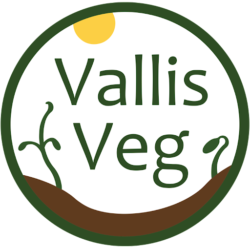Food crops require a lot of fertility in the soil to provide us with the nutritious food we need, and the soil they grow in needs to be well looked after so that it can grow good crops year after year. On this page, we explain our thinking about fertility and tillage at Vallis Veg.
Modern farming relies on synthetic nitrogen fertilisers which use prodigious fossil fuel energy in their manufacture, and which tend to create downstream pollution problems such as the notorious dead zone in the Gulf of Mexico caused by fertiliser-intensive American farming. Synthetic fertilisers are also misallocated globally, being used largely to squeeze a bit of extra productivity out of farms in wealthy western countries, when they’d be much more usefully directed to poor farmers in low income countries. For all these reasons, we don’t use them at Vallis Veg.
But organic fertilisers also have their problems. Routinely importing bulky organic composts like horse or cow manure or municipal compost uses so much fossil fuel that it’s scarcely preferable in energy terms to synthetic fertiliser. It can also bring toxins onto the holding, and it’s implicitly reliant on synthetic fertiliser inasmuch as its source materials are usually grown in this way. Therefore, we don’t import these organic composts onto our site either. The only materials we routinely import onto our site are wood chips from tree surgeons (the rationale being that this is a waste material that’s going to be driven around and dumped somewhere, so it might as well be on our site where we can use it to make seed compost and soil improvers), urine (carried inside the people who come onto the site) and a small amount of organically-certified reclaimed peat seed compost for our soil-block seed propagation system (see this blog post for a discussion of the rights and wrongs of reclaimed peat). This is supplemented by very occasional gifts of horse manure from an adjacent neighbour.
But that leaves us needing to generate fertility from somewhere! To summarise in a nutshell, we compost whatever we can that comes from our holding, use manure from our own livestock when we have some (effectively using them as ‘nutrient vectors’ to move fertility from the extensive ‘fertility-making’ parts of the holding such as our pastures and woodlands to the intensive ‘fertility-taking’ cropland) and we sow green manure leys using plants like clovers that are able to turn atmospheric nitrogen into useful plant food, and buckwheat which cycles soil phosphates. We also use urine on our wood chip compost heaps from human ‘nutrient vectors’.
The downside of green manures is that they usually need to be tilled in order that the succeeding crop can be established. Tillage is best avoided because it’s energy-intensive, increases greenhouse gas emissions from the soil, and damages soil life and soil structure. In some parts of the world (eg. arid, windy locations), tillage can be incredibly erosive and really does need to be avoided. Fortunately, that’s not the case here in wet, temperate Somerset and so on balance we think a fertility-building system based on green manure leys and judicious tillage is the lesser evil. But we’ve designed our cropping systems as carefully as possible in order to minimise the amount of tillage that we do (typically only tilling any given bit of our cropland every 4 years). And we’ve done quite a lot of research into the energy implications of different tillage/fertility systems, the various environmental issues around fertility and tillage, and the possibilities for ‘outside-the-box’ solutions such as moving from annual to perennial crops, (which don’t look great, in our humble opinion).
Like many things in life, we don’t believe that there’s a single perfect solution to the linked conundrums of fertility and tillage – perhaps the key problem that any would-be sustainable farming system has to resolve. We think our approach described above is a kind of ‘least worst’ option, but it’s something we’re always thinking about and discussing, so as always we welcome any comments or queries.
